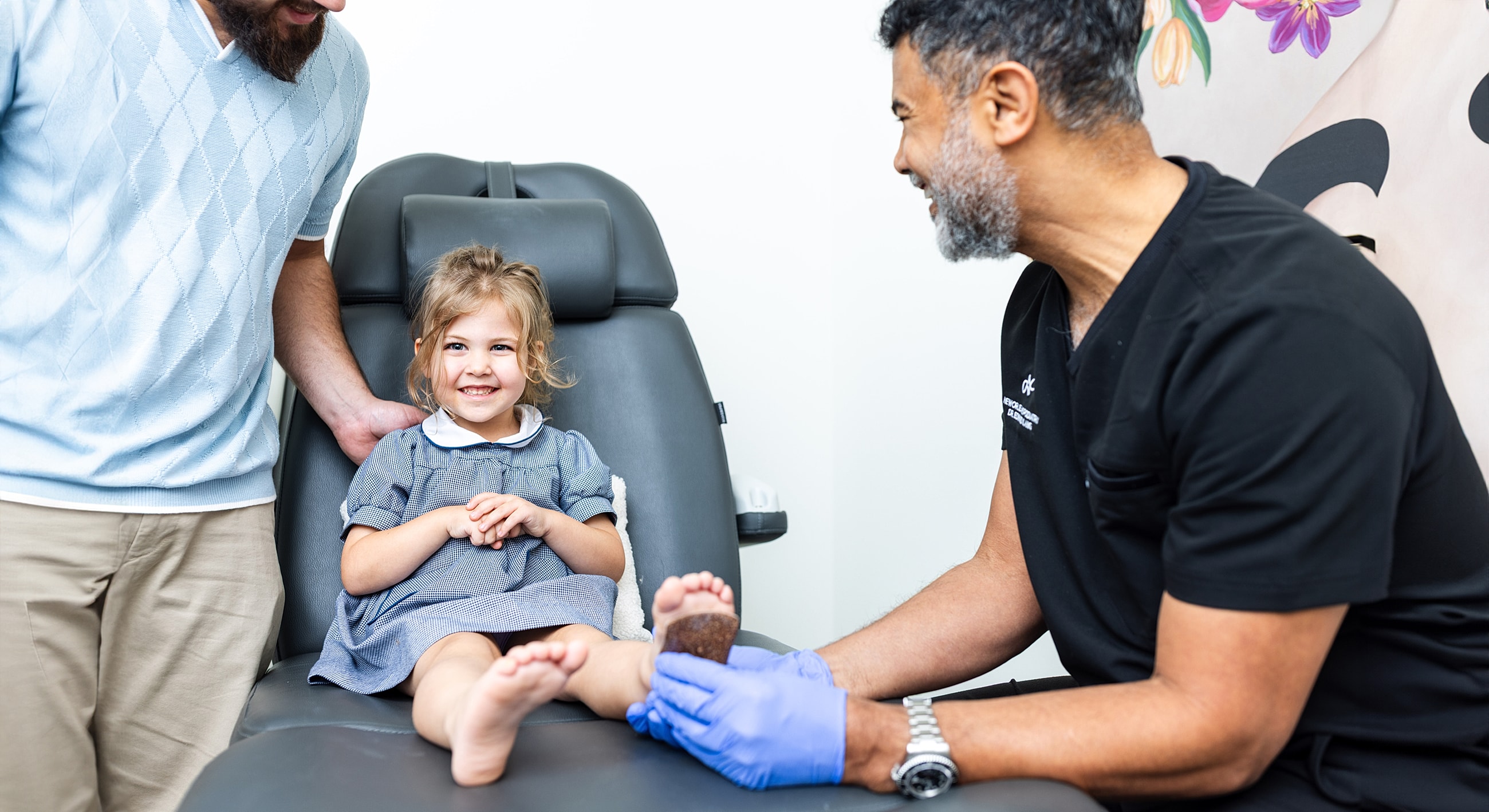
Pediatric Podiatry



At New Orleans Podiatry, we believe healthy feet set the stage for a lifetime of optimal health. Our pediatric podiatry services focus on early detection, accurate diagnosis, and thoughtful treatment of foot and ankle conditions in children of all ages, from toddlers taking their first steps to teens struggling with their first ingrown toenail.
Our team understands that kids are not simply small adults. Their foot problems, injuries, and ankle conditions often require different approaches than those used in older patients. We work closely with parents, pediatricians, and other healthcare providers to create treatment plans that protect long-term foot health while supporting healthy growth and development.
Specialized foot and ankle care for children, from age four through the teen years
Foot pain, heel pain, sports injuries, plantar warts, flat feet, and ingrown toenails
Early detection and treatment can prevent long-term foot and ankle conditions and support healthy development
Conservative treatments first, including gait plates, physical therapy, and footwear guidance; surgical care when necessary

In the early stages, many foot problems may be subtle—occasional limping, reluctance to participate in sports, or uneven wear on shoes. Left untreated, some conditions can affect a child’s gait, posture, and athletic performance. Regular check-ins with a pediatrics podiatry specialist allow us to identify potential problems before they lead to pain or long-term changes in the feet or ankles. We recommend a podiatry appointment if your child complains of ongoing foot pain, has difficulty walking or running, or experiences frequent injuries.
Childhood is full of growth spurts, sports activities, and occasional bumps and falls. Many foot issues can be corrected more easily when detected early. Some of the most common pediatric foot and ankle problems we treat include:
Young athletes place high demands on their feet and ankles, sometimes leading to overuse injuries or acute trauma. We specialize in treating sports injuries in children, helping them return to activity safely with a focus on both healing and prevention.
Our care often includes:
Ingrown toenails are common in children and can quickly become painful or infected if not treated properly. At New Orleans Podiatry, we offer compassionate, in-office or outpatient treatment at our surgery center to remove the ingrown nail and relieve discomfort—often in a single visit.
Our care often includes:
Pediatric flat foot occurs when a child’s arches fail to develop properly, causing the entire sole of the foot to touch the ground when standing. While many children have a flexible flat foot that resolves as they grow, others may experience persistent arch collapse, fatigue, pain, or difficulty with physical activities.
For mild, flexible flat feet, observation and supportive footwear are often all that’s needed. If pain or functional limitations occur, non-surgical options include custom orthotics, physical therapy, stretching exercises, and activity modification.
A podiatric medicine visit for your child is designed to be reassuring and educational for both patient and parent. During the appointment, we will:
Whenever possible, we use noninvasive treatments before considering surgical options. If surgery becomes necessary, Dr. Edward Lang’s experience ensures your child receives expert, compassionate care.

You should schedule a podiatry appointment if your child has persistent foot pain, heel pain, trouble walking, frequent tripping, or recurring sports injuries. Early detection of foot and ankle conditions can prevent long-term issues.
Common issues include flat feet, high arches, ankle problems, sports injuries, ingrown toenails, stress fractures, and growth plate inflammation. Some children may also need diabetic foot care or treatment for skin and nail concerns.
Some mild pediatric foot issues improve naturally as a child grows, but others—especially those causing pain or affecting gait—may require treatment. Early stages are the best time for intervention, so a pediatrics podiatry evaluation is recommended.
Ensure your child wears properly fitted, supportive footwear, avoids prolonged wearing of high heels or pointy shoes, and takes breaks from repetitive sports activities. Regular checks for shoe wear patterns can also reveal hidden foot problems.
Most children’s feet respond well to conservative treatments like orthotics, physical therapy, and activity modifications. Surgery is considered only if other treatments fail or if the condition severely affects your child’s daily life and activities.
Children’s feet are still developing, which means certain treatment approaches, timelines, and preventive strategies differ from adult care. A pediatric podiatry specialist understands growth patterns and how to guide healthy development.